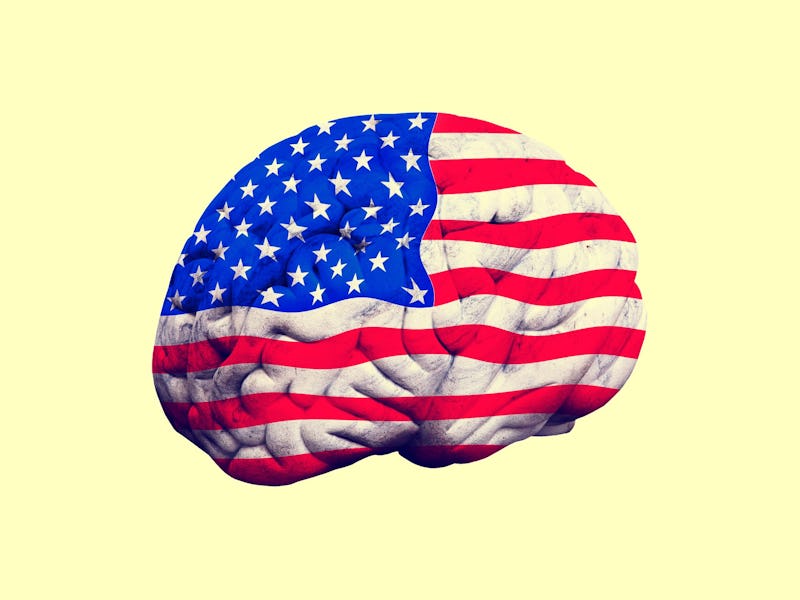The 1 step you can take to protect your mental health from politics
The action most critical to the political process is a mental health outlier.

Election day is Tuesday, November 3 although many Americans have already voted for the person they wish to be the next president. The polls also indicate something else: This election is a significant source of stress for many people, with 68 percent of adults reporting this.
That politics is stressful is not necessarily a surprising concept. We’re all aware of relationships made awkward by politics, ruined dinner parties, and subjects labeled “off-limits.” But it goes beyond the awkward: A 2019 study published in the journal PLOS ONE found many Americans believe their physical health was harmed by exposure to politics, with many also reporting politics “has resulted in emotional costs and lost friendships.”
Unlike much else, who is getting stressed is increasingly a bipartisan issue. Some 76 percent of Democrats and 67 percent of Republicans recently reported they are significantly stressed by the 2020 election. A 2007 Gallup poll, meanwhile, found 58 percent of Republicans reported “excellent mental health” compared to 38 percent of Democrats. The skew persisted even when the pollsters accounted for age, income, gender, education, and church attendance.
The action perhaps most critical to the political process — voting — appears to be an exception.
According to a 2018 analysis of young adults published in the journal Child Development, voting was a robust predictor of better mental health down the line and fewer risky health behaviors.
Political positives — Parissa Ballard is an assistant professor of family and community medicine at the Wake Forest School of Medicine and the 2018 study’s first author. She tells me that while there is much we don’t know yet about the connection between voting and mental health, her research did suggest voting was associated with better mental health over time.
“Although we could not explain why from the particular study, it may be that people who vote feel empowered and engaged with their communities,” Ballard says. “Empowerment and social connections can promote mental health.”
She notes there are other emotional positives associated with the political process as well. For some people political engagement can feel like a “constructive way to channel election-related stress or anxiety into action,” she says. People who are stressed by following the news closely might feel a sense of relief when they vote and engage in the process that could create the change they want.
"Empowerment and social connections can promote mental health."
The tricky thing with politics is that engaging with it “can function in both positive and negative ways for people and both can happen at the same time,” Ballard says. Engaging can be more stressful for some than others; some may feel fear and frustration, while others may feel positively connected to a purpose.
The 2019 PLOS ONE study, for example, found that the people most likely to believe politics are adversely affecting them include those who tend to discuss politics frequently and those who are actively involved in political activities. Its first author, Kevin Smith, a professor of political science at the University of Nebraska-Lincoln, tells me this isn’t necessarily because people feel bogged down by the issues they are concerned with. Instead, it may be more to do with the emotional up-and-down that comes with having a part of your identity tied to one political side.
“My suspicion is that the root cause of these problems is the emotional identification with one side or the other,” Smith says.
“If you become emotionally invested in one side of the other, and you are constantly talking about politics, trolling through your Twitter feed for political posts, and watching the news and the polls, etcetera, then you’re likely to be a bit of a constant emotional roller coaster — anger, joy, frustration, disgust, and you can experience all of that spending five minutes on Facebook.”
Mental health, and the 2020 election — After the 2016 election, psychologists observed a rise in what’s called “election stress disorder.” This outpouring of stress, anxiety, and resentment tied to the political process has already been observed in 2020 — before the election.
Indeed, the outpouring seems like a tidal wave. Ballard is working on a new study in which she and her colleagues attempt to understand the intense feelings and experiences people have that stem from an awareness of, exposure to, and involvement in politics. In October, they conducted a survey of more than 700 college students across the country. They found that 75 percent of the survey respondents are “stressed out” by the current election.
But whether or not election stress disorder will persist after November 3, Smith says, depends “not just on the outcome of the election, but what happens in its wake.”
“For example, if Biden wins a close election, but President Trump raises questions about the legitimacy of the vote and contests it — as he has hinted he may do — this could create an even more acrimonious and uncertain political environment,” Smith says.
“In that case, then yes, I could see a jump in the number of people dealing with a range of social and psychological issues related to politics.”
If the election has a clear winner and the loser accepts the legitimacy of the results, then “it could bring the temperature of the political environment down,” Smith says. If the election goes the way polls currently predict, he can definitely see this happening. (As of 10/22, the polling average puts Biden ahead of Trump nationally.)
“Of course,” Smith says, “on the losing side, things might still feel worse.”
This article was originally published on